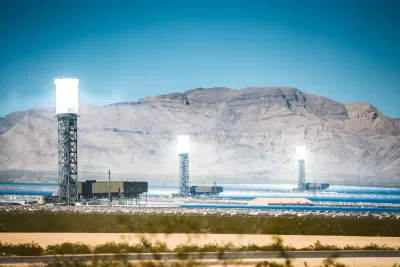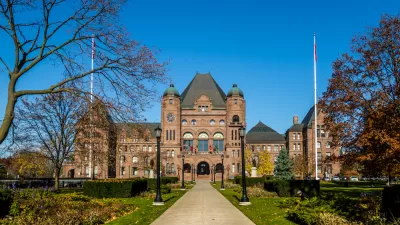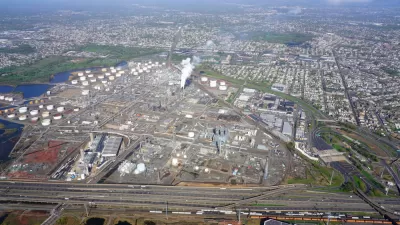A California state senator has proposed to overhaul California’s cap-and-trade system explains the changes he wants to see.

California successfully defended its cap-and-trade program from a recent legal challenge, but it still has to wrestle with what will happen when the program expires in 2020—especially since the state emissions reduction target extends to 2030.
One proposal, from Senator Bob Wieckowski, is to essentially replace the current system with a new version of cap and trade that would change both how carbon is priced and how the revenues are spent. In The Planning Report, Wieckowski describes the three broad categories of investment his plan would create: climate research, infrastructure adaptation, and a new consumer program called "climate dividends."
"When we set a cap, there is necessarily going to be an increase in the price of gasoline and carbon-based products," he explains. "The idea is to return some of the money generated to the consumer, to ease the increased direct costs that we anticipate."
He also wants to see the state's investment in infrastructure shift to prioritize the upgrade or even relocation of basic facilities like sewers and roads, especially in disadvantaged communities.
Some of these facilities are located in areas that are endangered by sea-level rise and climate change. As we rebuild them, it may not be possible to simply fortify the surrounding ground. They may actually have to be moved to, for lack of a better term, higher ground. That’s quite a change from how we’re using cap-and-trade funds right now.
New technologies and innovations, meanwhile, would be explored through a third bucket of money dedicated to researching best climate adaptation practices. That approach speaks to Wieckowski's broader vision of where California fits into the global effort toward resilience.
"California's forte is the export of problem-solving ideas and devices that can help out the rest of the world," he says. Especially in light of the Trump administration's "disinterest" in climate action, he says, "People are looking for answers from us. How California goes, the world wants to go."
FULL STORY: State Senator Wieckowski Offers Alternative to Post-2020 Cap and Trade

Alabama: Trump Terminates Settlements for Black Communities Harmed By Raw Sewage
Trump deemed the landmark civil rights agreement “illegal DEI and environmental justice policy.”

Planetizen Federal Action Tracker
A weekly monitor of how Trump’s orders and actions are impacting planners and planning in America.

The 120 Year Old Tiny Home Villages That Sheltered San Francisco’s Earthquake Refugees
More than a century ago, San Francisco mobilized to house thousands of residents displaced by the 1906 earthquake. Could their strategy offer a model for the present?

Ken Jennings Launches Transit Web Series
The Jeopardy champ wants you to ride public transit.

BLM To Rescind Public Lands Rule
The change will downgrade conservation, once again putting federal land at risk for mining and other extractive uses.

Indy Neighborhood Group Builds Temporary Multi-Use Path
Community members, aided in part by funding from the city, repurposed a vehicle lane to create a protected bike and pedestrian path for the summer season.
Urban Design for Planners 1: Software Tools
This six-course series explores essential urban design concepts using open source software and equips planners with the tools they need to participate fully in the urban design process.
Planning for Universal Design
Learn the tools for implementing Universal Design in planning regulations.
Clanton & Associates, Inc.
Jessamine County Fiscal Court
Institute for Housing and Urban Development Studies (IHS)
City of Grandview
Harvard GSD Executive Education
Toledo-Lucas County Plan Commissions
Salt Lake City
NYU Wagner Graduate School of Public Service




























